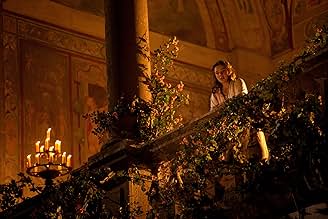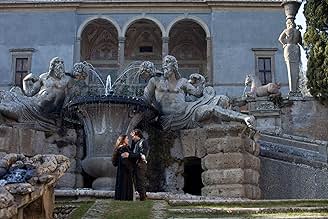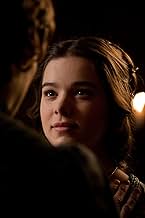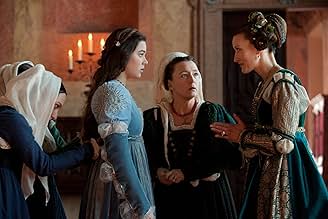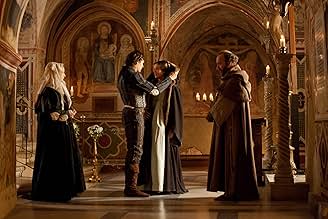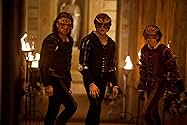Romeo and Juliet secretly wed despite the sworn contempt their families hold for each other. It is not long, however, before a chain of fateful events changes the lives of both families fore... Read allRomeo and Juliet secretly wed despite the sworn contempt their families hold for each other. It is not long, however, before a chain of fateful events changes the lives of both families forever.Romeo and Juliet secretly wed despite the sworn contempt their families hold for each other. It is not long, however, before a chain of fateful events changes the lives of both families forever.
- Director
- Writers
- Stars
- Awards
- 2 wins & 2 nominations total
- Second Capulet Servant
- (as Marcus Cotterell)
- Director
- Writers
- All cast & crew
- Production, box office & more at IMDbPro
Featured reviews
That's about the best that can be said for it. Fellowes, the screenplay writer, has actually written some new scenes that are not bad examples of blank verse in the Elizabethan style, but they do not have the genius of Shakespeare, and the new scenes don't add much to the story. Replacing Shakespeare's words with his own, which he does far too often, invariably results in poorer and less interesting lines.
Unfortunately, the leads aren't persuading anyone that they are in love, and our attention is drawn instead to some good performances by the supporting cast, especially Damian Lewis's Capulet, which I think is the best performance by anyone as Capulet on screen ever.
So, generally, apart from Lewis, you are much better off watching Zeffirelli's film.
As a lover of Shakespeare I thoroughly enjoyed the film and feel it's a good introduction for youngsters.
it's a fabulous movie if you love romance and drama and I would thoroughly recommend it.
But let's face it; Elizabethan Theatre is an entirely different writing medium to modern film adaption. There are a number of things that had to happen in those days. Notice they say 'I die' every time someone dies? They talk about their feelings an exceptional amount? And there are other near invisible things that would be entirely different. Shakespeare may have been a genius, but if you pulled up an unknown script of a similar level of genius from this era and made a word for word film, I doubt you could expect a great audience reaction. I've seen kids literally sleep through Polanski's Macbeth and even shrug at Zeffirelli's Romeo and Juliet (except when they were noting the lead's similarities to Zefron), yet be highly engaged by the stage performance of the play.
Visually, this film is utterly gorgeous. Whoever chose the locations deserves a french kiss from the world. From the first shots of Juliet running in her orange dress, the audience is stunned by the use of colour and scenery. The costumes were great (I don't think anyone was complaining when we saw a gorgeous Douglas Booth is an open white shirt chiseling away). The hair was to die for and the acting wasn't so bad as everyone makes out. Fact is, everyone's used to it being acted VERY Shakespearean. Which isn't how films work. If you're asking for that style of acting, you ought to see the play and burn the movie. The actors here took a more naturalistic approach, which seems flat, but that's probably because it's naturalistic and this is Elizabethan theatre in a period adaption for a 21st century audience. Are we seeing where some things are bound to get tangled?
That all said, there are two things that I can't justify:
- Far too much kissing. Like all the time. It felt like too much sometimes. A lot. This is probably where people see the lack of chemistry, because the kisses seem to come out of nowhere, are accompanied with virtually no crescendo musical masterpieces or great camera shots, and are usually cock-blocked by the nurse.
- Unless your students are well versed in the play, this shouldn't be the go to for schools studying Romeo and Juliet. Let's face it; a lot of kids don't exactly read the whole play, might write things in their essays that only happened in the movie if they watch it. The thing that everyone complains about (the adding of lines) is only truly detrimental here. The other versions (Baz's and Zeffirelli's) only omitted things, rather than adding things, and is a lot safer for educational purposes.
If you're not studying it; if you haven't studied it to the point at which added lines would make you feel ill; if you aren't an absurd prat about purist R&J (keep Shakespeare Shakespearean? I don't even...), then this is a good movie. And Booth is delectable. Always.
The movie is interesting, keeps the essence of the original story, but changes the dialogues and interpretation, abandoning the artificial tone of Shakespearean theater and taking a more natural posture. The idea is good, its a breath of fresh air, but I think the posture adopted is too "XX century" and something is missing in the way the characters act that remind us the fifteenth century. One of the most reprehensible things is the amount of kisses and touches. This does not fit the historical period depicted, much more puritanical than ours. The actors did a decent job, engaged and committed to the story itself. Douglas Booth was by far the best Romeo I've seen in the movies, much more credible than Leo was in "Romeo + Juliet". Hailee Steinfeld was not bad either, but her acting has seemed a little forced in some scenes. Everything else is absolutely impeccable: the bright, colorful picture is magnificent, in harmonious combination with the great scenery and locations chosen for filming, and that depict faithfully what have been Verona during this time. The costumes also fit into the historical period and are exquisite. The soundtrack, discrete but present, fulfills her role with great skill.
Far from being a bad movie, this movie will never be understood by the public who are not able to see the difference between literature, theater and cinema. Despite some minor flaws, the film is well done and does not deserve at all, in my opinion, the severe criticism it has received.
Did you know
- TriviaLily Collins was the original choice for Juliet but dropped out due to scheduling conflicts. Hailee Steinfeld later replaced Collins.
- GoofsJust before the balcony scene Romeo says "He jests at scars that never felt a wound" which is an original line from the play. However, in the play this line is in reference to a series of jests Mercutio shouts at this time about his love for Rosaline. All the jests were cut from the movie, so having Romeo comment about them doesn't make sense.
- Quotes
Romeo: If I profane with my unworthiest hand, This holy shrine: my lips, two blushing pilgrims, ready stand, to smooth that rough touch with a tender kiss.
Juliet: Good pilgrim, you do wrong your hand too much. Which mannerly devotion shows in this, for saints have hands do touch. Palm to palm is holy palmers' kiss.
Romeo: Have not saints lips and holy palmers too?
Juliet: Ay, pilgrim, lips that they must use in prayer.
Romeo: O, then, dear saint, let lips do what hands do. They pray, grant thou, lest faith turn to despair.
Juliet: But, Saints do not move their palms for prayers' sake.
Romeo: Then move not. While my prayer's effect I take.
[kiss]
Romeo: Thus from my lips, by yours, my sin is purged.
Juliet: Then have my lips the sin that they have took.
Romeo: Sin from thy lips? O trespass sweetly urged! Give me my sin again.
[kiss]
- ConnectionsFeatured in Weekend Sunrise: Episode dated 8 February 2014 (2014)
- SoundtracksL'Amor Dona Ch'Io Te Porto
Anonymous, late 15th Century
Performed by Ensemble La Rossignol
P 2003 Tactus Records - Licensed by
Machiavelli Music Publishing
- How long is Romeo & Juliet?Powered by Alexa
Details
- Release date
- Countries of origin
- Official sites
- Languages
- Also known as
- Romeo
- Filming locations
- Production companies
- See more company credits at IMDbPro
Box office
- Gross US & Canada
- $1,162,635
- Opening weekend US & Canada
- $520,116
- Oct 13, 2013
- Gross worldwide
- $2,966,268
- Runtime1 hour 58 minutes
- Color
- Sound mix
- Aspect ratio
- 2.35 : 1
Contribute to this page








